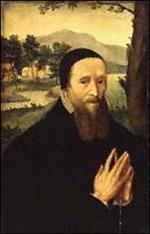|
This section contains 353 words (approx. 2 pages at 300 words per page) |
Encyclopedia of World Biography on Richard Hooker
The English divine Richard Hooker (1554-1600) is best known for his "Ecclesiastical Polity," a work that provided a solid theological basis for the newly established Church of England.
Nothing is known of Richard Hooker's early life apart from his birth at Exeter in Devonshire. He went to Corpus Christi College, Oxford, about 1568. His appointment as deputy to the regius professor of Hebrew is one of the best-known events in his Oxford career; and a small pension of £4 a year was given Hooker by the mayor and Chamber of Exeter in 1582. It is likely that he left Oxford in 1584, when he was presented to the vicarage of Drayton Beauchamp. It is possible that he never resided there, because he was negotiating in London for the mastership of the Temple Church, which he got in 1585. In 1588 he married Joan Churchman; they later had two sons, who died in infancy, and four daughters.
While at Oxford, Hooker had been tutor to Edwin Sandys, who was to have a notable career as a statesman, become a director of the Virginia Company, and be knighted. Hooker sold the copyright in the eight books of his Ecclesiastical Polity to Sandys for about £50 plus a certain number of copies of the printed books; while, for his part, Sandys was to get the books printed. Only the first five appeared and at considerable cost to Sandys: the first four in 1593, the fifth book in 1597. Why the last three books were not published until the middle of the 17th century has caused much discussion among scholars, touching not least upon the genuineness of these volumes. In 1591 Hooker had accepted the living of Boscombe in Wiltshire, from which in 1595 he went to the living of Bishopsbourne, near Canterbury, where he died.
C. J. Sisson, perhaps the greatest modern Hooker scholar, stated: "In the long and crowded roll of great English men of letters there is no figure of greater significance than Hooker.... His own life's work is a monument of pure and splendid prose style and of lucid philosophic thought, based on unsurpassed scholarship in the vast field of his theme."
|
This section contains 353 words (approx. 2 pages at 300 words per page) |


